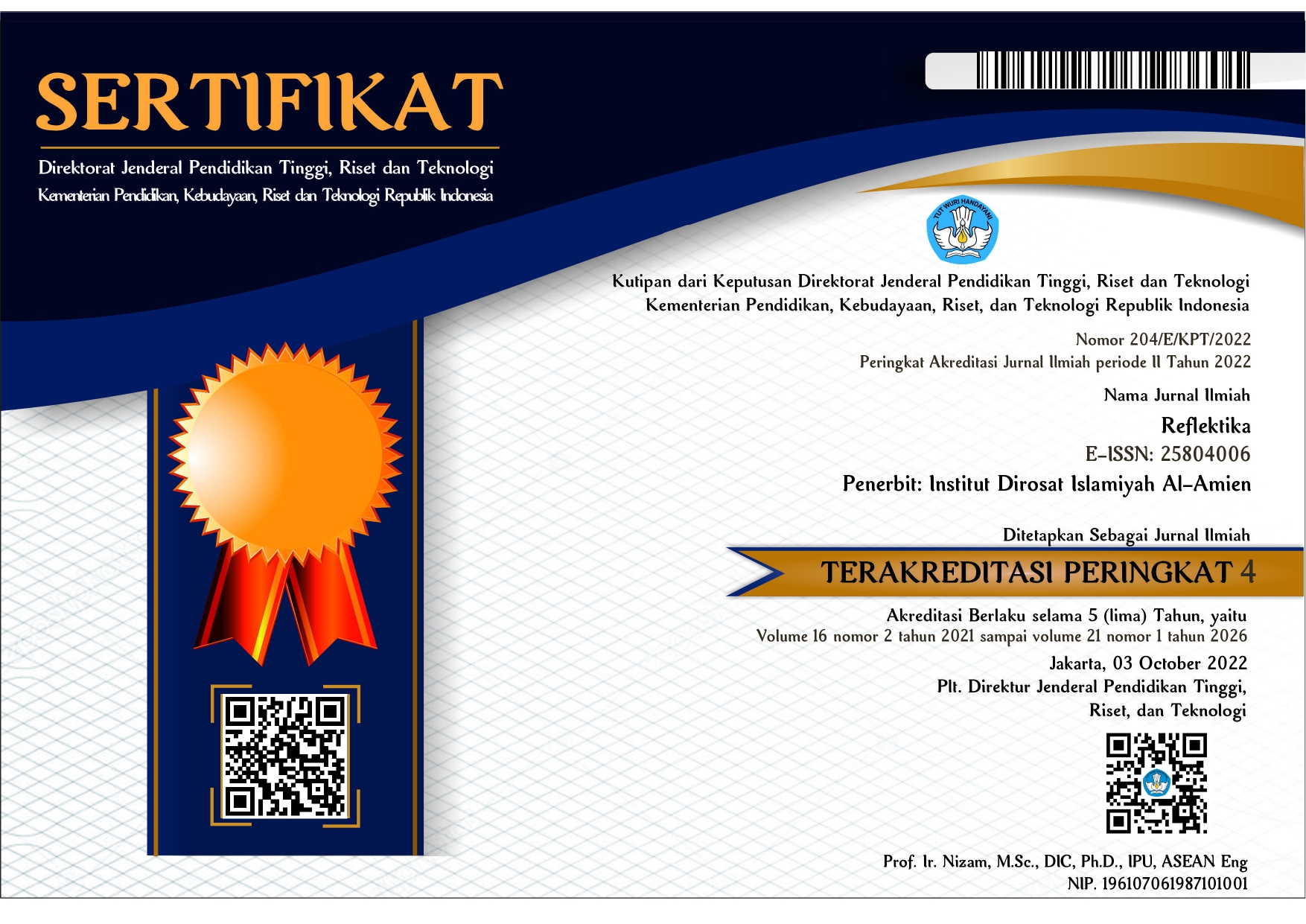TRADISI OGHEM DI SUMENEP (Studi Living Qur’an Penyelesaian Masalah Dengan Istikhara Mokka’ Oghem)
Abstract
As the holy book for Moslems and also the big miracle (Mukjizat Kubro) for prophet Muhammad, al-Qur’an has been a part of life for Moslem society that has many functions and penetrate in any parts of their life. It’s not only as the source of the study of Islamic law, al-Qur’an has been also fulfilling the part of tradition, culture and religion routines through their cultures. Al-Qur’an has been also being the parts of Moslem’s social activity, not only for religious activity. Reciting al-Qur’an is not only as a dialy routine activity that they hope reward from God, but also as an activity that they hope can treat any diseases and solve any problems for personal life, family or relatives and also social society. Along the times flow and many problems of life, Moslem society always do some efforts to make al-Qur’an as a media to solve their problems of life that it may come from a massive group or community or personal, not only a guideline of law and worship. Among the efforts to make al-Qur’an as media of problem solving in Moslem life is Mokka’ Oghem by using Al-Anbiya’. Al-Anbiya’ is a book that consists of the stories of prophets and preceding Moslems that has been told in al-Qur’an and tafsir . The tradition of Mokka’ Oghem has been used by Moslem society of Sumenep as the way to make a decision or istikhara when they face any problems or difficult choises.
Many people give positif respond to the result of istikhara oghem, it's known when they help each other when one of them have any problem so that they attend oghem. So, the tradition of oghem is still exis until now.
Keywords
References
Afandi, A.khozin. Langkah Praktis Merancang Proposal. Surabaya: Pustakamas, 2011.
Al-Bukhari, Muhammad bin Isma’il. Al-JÄmi’ Al-ShahÄ«h Al-Mukhtashar, Juz 4. Edited by Musthafa Al-BighÄ. Bairut: DÄr Ibn KatsÄ«r, 1987.
———. Al-JÄmi’ Al-ShahÄ«h Al-Mukhtshar, Juz 5. Bairut: DÄr Ibn KatsÄ«r, 1987.
Al-QatthÄn, MannÄ’ bin Khalil. Mabahits Fi ‘Ulum Al-Qur’An. t.t: Maktabah Al-Ma’Ärif, 2000.
Al-SyaibÄnÄ«, Abu Abdillah Ahmad bin Muhammad bin Hambal. Musnad Al-ImÄm Ahmad Bin Hambal, Juz 24. t.t: Muassasah Al-Risalah, 2001.
Kaelen. Metodologi Penelitian Kualitatif Bidang Filsafat. Yogyakarta: Pradigma, 2005.
KatsÄ«r, AbÅ« Al-FidÄ’ Ismail bin Umar bin. Al-BidÄyah Wa Al-NihÄyah, Juz 3. t.t: DÄr Al-Fikr, 1986.
Ma’bad, Muhammad Ahmad Muhammad. NafahÄt Fi ‘UlÅ«m Al-Qur’Ān. Kairo: DÄr Al-SalÄm, 2005.
Madura, Lontar. “Search for ‘Tradisi Macapatan Di Jawa Dan Madura.’†Accessed December 16, 2019. http://www.lontarmadura.com/?s=Tradisi+Macapatan+di+Jawa+dan+Madura&x=0&y=0.
Mansur, M. Living Qur’an Dalam Lintasan Sejarah Studi Qur’an, Dalam Metodologi Penelitian Living Qur’an Dan Hadis. Yogyakarta: TH-Press, 2007.
Moelong, Lexy. Metodologi Penelitian Kualitatif. Bandung: PT Remja Rosda Karya, 2013.
Mustaqim, Abdul. Metode Penelitian Living Qur’an: Model Penelitian Kualitatif, Dalam Metodologi Penelitian Living Qur’an Dan Hadis. Yogyakarta: TH-Press, 2007.
Rusli, Mohammad. Metode Penelitian Kualitatif Dan Kuantitatif. t.t: Pramadina, 2013.
Rusman, Dadan. Metode Penelitian Al-Qur’an Dan Tafsir. Bandung: cv Pustaka Setia, 2015.
TIK, Puslitbang Konten Lokal Madura Berbasis. “Kamus Bahasa Madura.†Accessed December 16, 2019. http://kamus.madura.web.id/?ask=o#.
DOI: 10.28944/reflektika.v15i1.393
Refbacks
- There are currently no refbacks.


.png)

